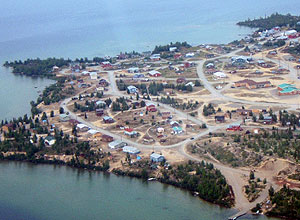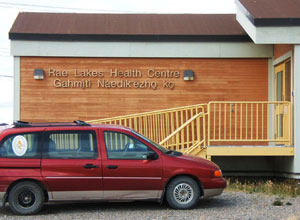 Welcome to the community of
Welcome to the community of
Gamètì, Northwest Territories,
Canada. Located along the, chain of waterways connecting Great Slave Lake to Great Bear Lake.
Gamètì was formally known as Rae Lakes. The name was officially changed to Gamètì under the Tłįcho Agreement in 2005.
Situated between two pretty lakes, Gamètì is midway between Great Slave and Great Bear Lakes in a traditional hunting area of the Tłįcho and Sahtu dene peoples.
Although the site was long used as a temporary camp, in the 1970s an airstrip, school, store and new log houses were built, and families settled here.
Gamètì has a community store, hotel and restaurant, fire station, health centre and a four classroom school. Social workers from Whatì and Behchokö regularly provide services to the community.
Gamètì is on a point between Rae Lake and Lac Ste. Croix and fishing, hunting and trapping are still part of the economy here. In summer, anglers can fly-fish for Arctic grayling, and stay at a comfortable motel.

The development corporation owns one of the caribou hunting operations located on the barrenlands northeast of the community. Tours on the lakes can be arranged through the Tłįcho Government Office.
Visitors can fly to Gamètì year round on scheduled flights from Yellowknife or drive a 213 km winter ice road from Highway 3 near Behchokö (January to March). Fine Tłįcho beaded or embroidered clothing and traditional snowshoes can be purchased at the general store. The Dene drummers from Gamètì travel to many regional events and celebrations.
Today, residents are employed in Tłįcho companies, in local government and business, or work on rotation at the diamond mines. However the traditional subsistence hunting, fishing and trapping are still practiced here.
Alcohol is prohibited, by community plebiscite.
Taken from the NWT Bureau of Statistic
|
Population (2007) 307 |
Primary Language (2004)
98.5% speak Tłįcho
|
Traditional Activities (2003) 41.6% Hunting & Fishing 16.7% Trapping 50%Consuming Country Foods |


